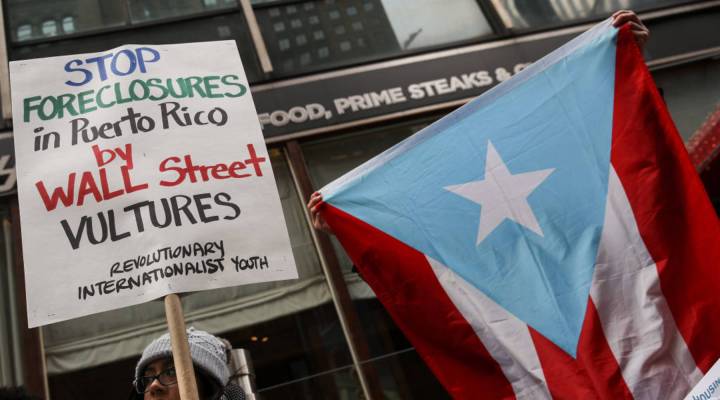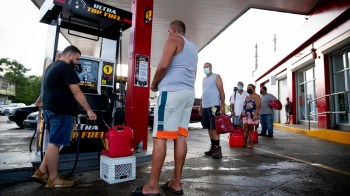
What will happen to all the abandoned homes in Puerto Rico?
What will happen to all the abandoned homes in Puerto Rico?

This is just one of the stories from our “I’ve Always Wondered” series, where we tackle all of your questions about the world of business, no matter how big or small. Ever wondered if recycling is worth it? Or how store brands stack up against name brands? What do you wonder? Let us know here.
Listener Timothy Tyckoson from Deltona, Florida asked Marketplace this question:
With the news of thousands of people leaving their homes in Puerto Rico, I was wondering what really legally happens to their abandoned homes? Do they retain their ownership or is it forfeited?
By the end of November, more than 208,000 people made their way from the Hurricane-ravaged island of Puerto Rico to Florida. As many as 750,000 people are expected to leave Puerto Rico over the next four years. Many of them left — and will leave — their homes behind.
What will happen to the houses left behind depends on whether the house has been paid off or whether the owners are still making mortgage payments. If the house still has a mortgage and payments on that mortgage are not being made, then the home will be foreclosed on, according to Ricardo Ramos-González, coordinator of a consumer legal aid clinic at the University of Puerto Rico School of Law.
“Any abandoned property that has a mortgage will be subject to a judicial foreclosure process. Until then, the ownership will be retained by its lawful owners,” he said. “Then if they are finally foreclosed, it will become a real estate owned (REO) property of the particular bank. There is no special process to deal with that situation.”
The real fall out from Hurricane Maria, which made landfall on Sept. 20, has yet to be determined. After the Hurricane passed, banks and the federal government imposed a three-month moratorium during which foreclosures, late fees and credit scores reporting was suspended. While banks have ended their moratorium this month, the federal government has extended its moratorium until March.
Even before some of the moratoriums came to an end, there was widespread confusion about who qualified. Some homeowners assumed that moratoriums were extended to everyone. They were not.
More than 20,500 people who received moratoriums from Bank Popular — Puerto Rico’s largest bank — saw them expire in December and January. The bank is now ready to start collecting payments again, even if some parts of the island are still without power, thousands of people have lost their jobs and about 30 percent of small- and medium-sized businesses are still closed.
“Those clients that truly are not responding to the bank’s letters are those who really will be at risk of facing a foreclosure,” Jose Teruel, first vice president of the consumer credit services division at Banco Popular, told the Associated Press.
Threat of foreclosure is nothing new for many Puerto Ricans.
The Puerto Rico foreclosure crisis was years in the making
Even before Hurricane Maria made landfall, Puerto Rico was facing a foreclosure crisis. The island had a mortgage delinquency rate that was three times the national average. About 33,000 homes were foreclosed from 2009 to 2016. In 2016, a record high of 5,424 homes were foreclosed, according to NBC. On an island with 3.4 million people, an average of 14 families were losing their home every day to foreclosures.
“The foreclosure problem that Puerto Rico has experienced over the past few years is actually worse than what we saw during the height of the foreclosure crisis nationwide,” Daren Blomquist, senior vice president with Attom Data solutions, a U.S. housing data provider, told NBC in June.
Then came Hurricane Maria.
The troika: Harvey, Irma, Maria
Hurricane Maria was not the only storm to leave a wake of damaged and abandoned properties in its wake last year. By the end of 2017, there were 142,700 severely delinquent loans linked to last year’s storms — 102,500 in Florida and Georgia are attributed to Hurricane Irma while another 40,200 in Texas are said to be result of Hurricane Harvey, according to Black Knight, a financial data firm that collects and monitors monthly mortgage data. These delinquent loans represent 20 percent of all such delinquencies nationwide.
These numbers have been climbing every month since the storms hit. That should not be a surprise considering that according to Black Knight as many as 4.8 million mortgaged properties were in the path of Hurricanes Harvey, Irma and Maria. Their unpaid principal balance was nearly $746 billion, CNN reported in November.
Abandoned homes that are paid off
However, not all homes that have been left behind come with a mortgage. Some have already been paid off. In that case, its owners would still be required to pay local property taxes even if the home sits empty. What happens when owners do not pay their property taxes can differ from state to state.
The most relevant case study here would be what happened in Louisiana after Hurricane Katrina. It’s been over 12 years since the storm hit, yet many homes remain abandoned and damaged. These houses are often referred to as “blighted.” One of the reasons why the local government struggled to deal with these properties is because it actually cannot just seize them and sell them off.
“Before the city can sell a tax-delinquent property, state law requires the public and all owners to be notified and mandates waiting periods of up to three years. During that time, an owner could get back in the game by making a minimal tax payment,” according to a Reuters’ 2015 report on the 10 anniversary of the storm.
If the house is not tax-delinquent, the officials would have to track down the owner and try to purchase the house. Many of the blighted houses in New Orleans that had been paid off were passed down from generation to generation. Some of them are now owned by multiple heirs. The New Orleans Redevelopment Authority has been tracking down owners in an effort to purchase the homes from them and sell them at auctions or to neighbors interested in expanding their property.
It is too early to tell if a similar situation might occur in Puerto Rico.
| What recovery looks like for a small, historic Puerto Rico town |
| Puerto Ricans fleeing Maria seek a New York foothold |
There’s a lot happening in the world. Through it all, Marketplace is here for you.
You rely on Marketplace to break down the world’s events and tell you how it affects you in a fact-based, approachable way. We rely on your financial support to keep making that possible.
Your donation today powers the independent journalism that you rely on. For just $5/month, you can help sustain Marketplace so we can keep reporting on the things that matter to you.


















